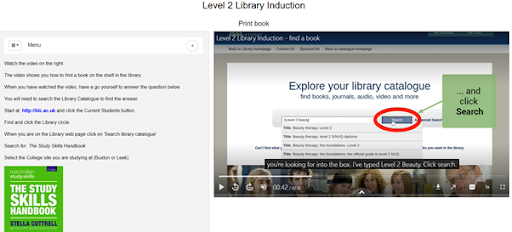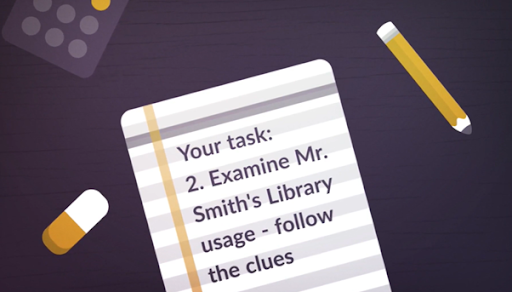In this guest blog post, Liz White talks about the planning involved in moving Library Induction online for FE students during the current pandemic. Liz is Assistant Academic Librarian at the University of Derby and the Further Education Sector Representative for the Information Literacy Group.
Introduction

As Assistant Academic Librarian at Buxton and Leek College I found myself earlier this year, along with our Library Facilitators, pondering how we could deliver Library Inductions to our FE students while keeping them safe from Covid and without compromising quality. The College, part of the University of Derby, has two sites – Buxton and Leek – with 16-19 FE (ranging from Learning Development groups and level 1 through to level 3), adult FE delivery and College HE courses on offer. We decided to plan online induction activities in place of face-to-face delivery of our introductory sessions. At the point of planning, we had no idea if we would be able to accept groups into the Library or not, but we recognised that developing activities suitable for remote or classroom delivery meant we could ensure high quality introductions to the information literacy skills students need to succeed.
The Challenges
Before Covid, we delivered tailored in-person induction sessions for each FE level. Inductions were delivered by myself in Leek and the Library Facilitator team in Buxton. Each set of activities (which included Escape Room, iPad-based activities and treasure hunt style games to introduce key library skills via active learning) was differentiated to eliminate repetition as students progressed. So, when planning online activities, it was necessary to do the same.
The Solutions
We decided to include an online library tour for all students, which our Media Officer created using Prezi. A tour for each campus served as an introduction for new students as well as a reminder for returners. The tour not only showed the layout of each Library but also the location of key things such as printers, self-service points and Help Desks.
The differentiated activities were more of a challenge – in the Library setting students can use the catalogue and find books on the shelf while they are there, and it’s possible to gauge their levels of engagement and success when everyone is in the same room. We needed to replicate this as closely as possible, as asynchronous online activities.
Padlet was decided upon as the best platform. A Padlet for each level, with activities embedded to allow easy access to each was a logical solution and it was possible to customise them to be more engaging for FE students.
Levels 1 and 2
We embedded screen capture videos showing how to find items on the Library catalogue for levels 1 and 2. This was followed by a quiz directing students to find a specific book, asking questions about key information e.g. the author; shelfmark; and for level 2, a chapter title of an eBook. Using Padlet’s Canvas format we connected the tasks with arrows to indicate the order of activities.
The quizzes either utilised MS Forms or LibWizard – our Academic Librarian Team at the university were trialling LibWizard and this was a great opportunity to do this with a live activity for an FE group. The benefit of LibWizard was that videos could be embedded into the tutorial format with quiz activity detailed on the left panel. Students would have to open a new tab to navigate to the library catalogue but everything else was contained on one tab and they could easily flick between the two. The MS Forms quiz was a simpler format for level 1, with fewer activity questions.

Image: Screenshot of the Level 2 Library Induction LibWizard tutorial
The Padlets can be viewed via these links*:
Level 1: https://derbyuni.padlet.org/lwhite144/Level1
Level 2: https://derbyuni.padlet.org/lwhite144/Level2
Level 3
The level 3 induction presented a bigger challenge as we wanted to introduce not only using the Library Catalogue but also our FE discovery tool, Discover (incorporating eBook search, magazine search and Gale OneFile: News). We had previously discussed adapting a level 3 tutorial session, Mystery in the Library, as a face-to-face induction so decided to utilise this for the online activities instead. The session had originally been an in-person session developed by my colleagues in the university, and had already been adapted for FE level 3. An engaging theme, using the linear Timeline layout on Padlet, it was easy to set out tasks in a systematic way.
An introductory video made on Biteable, complete with Jazzy Casino Heist music, sets the scene before students find 8 clues, by searching Library resources, that help them identify the suspect.

Image: Screenshot from L3 Mystery In The Library introduction video.
The Level 3 induction, Mystery In The Library, can be viewed here*: https://derbyuni.padlet.org/lwhite144/LibraryMystery
Tracking
Students entered their student numbers at the end of the quiz, enabling us to track completion and ensuring that we could identify which groups had not interacted with the materials. Students who completed had a note added to eTrackr, so they could see that we had noted their engagement.
Feedback
For all levels, there was an opportunity for students to tell us what they thought of the activities via a MS Forms survey. At time of writing, the activities are rated at 4+ out of 5 for increasing students’ confidence in using Library resources.
Benefits
By developing these online activities we have provided an opportunity for students to experience basic searches and interact with IT systems (e.g. MS Forms) which they will need while at the College, and during unprecedented circumstances when delivering our regular induction programme was not possible. Not delivering face-to-face sessions freed up time for Facilitators on campus to answer online Library enquiries (of which there have been considerably more this semester) and for myself, an opportunity to meet HE students earlier in the semester than is usually possible. Of course, the benefits of delivering induction face-to-face outweigh those of online delivery, but under the current circumstances we were happy with the finished products. It is possible that post-Covid we could offer a blend of both formats depending on students’ requirements.
Delivery
We had hoped that tutors would incorporate the online induction into their first two weeks’ timetable, and for students to complete them in class. Our Library Experience Manager and I delivered a Library update at an all-staff training event in August and described the induction plan. Padlet links were emailed to Curriculum Leaders to be embedded into the VLE, so staff and students could access them easily.
Ongoing Challenges
However, despite ‘the best laid plans of mice and men’, there were unforeseen barriers. Laptops in classrooms had been removed to provide loans for students working remotely so groups could not complete inductions in class; tutors were having to introduce a range of new concepts to students in relation to Covid restrictions and processes; plus there were so many additional messages about the start of a new and unusual term, ours was lost among them, in many cases.
By tracking students who have completed, we have discovered groups not accounted for. We will pass on data (that is being compiled as I type) to Curriculum Leaders so that missing groups can complete the induction before this semester ends.
Summary
In 2019, none of us could have predicted that we would need to create online induction materials for this Autumn semester, so to have done this for FE students in such an engaging way, while working remotely, we are counting as a huge achievement! However, a repeat of this situation would require a more robust system for securing engagement by teaching staff. Reporting completion data more regularly would be helpful, and we could be set up to do that in advance in the future. After Christmas the 2020 induction period will be reviewed and we can look forward to the next one – I wonder what 2021 will bring us?
*You are welcome to view the Padlets – however you would need a BLC log-in to access some of the resources and activities.



